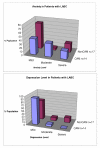The use of complementary and alternative medicines among patients with locally advanced breast cancer--a descriptive study
- PMID: 16504038
- PMCID: PMC1475605
- DOI: 10.1186/1471-2407-6-39
The use of complementary and alternative medicines among patients with locally advanced breast cancer--a descriptive study
Abstract
Background: Complementary and alternative medicine (CAM) use is common among cancer patients. This paper reviews the use of CAM in a series of patients with locally advanced breast cancer (LABC).
Methods: Women with LABC attending a specialist clinic at a single Canadian cancer centre were identified and approached. Participants completed a self-administered survey regarding CAM usage, beliefs associated with CAM usage, views of their risks of developing recurrent cancer and of dying of breast cancer. Responses were scored and compared between CAM users and non-users.
Results: Thirty-six patients were approached, 32 completed the questionnaire (response rate 89%). Forty-seven percent of LABC patients were identified as CAM users. CAM users were more likely to be younger, married, in a higher socioeconomic class and of Asian ethnicity than non-users. CAM users were likely to use multiple modalities simultaneously (median 4) with vitamins being the most popular (60%). Motivation for CAM therapy was described as, "assisting their body to heal" (75%), to 'boost the immune system' (56%) and to "give a feeling of control with respect to their treatment" (56%). CAM therapy was used concurrently with conventional treatment in 88% of cases, however, 12% of patients felt that CAM could replace their conventional therapy. Psychological evaluation suggests CAM users perceived their risk of dying of breast cancer was similar to that of the non-Cam group (33% vs. 35%), however the CAM group had less severe anxiety and depression.
Conclusion: The motivation, objectives and benefits of CAM therapy in a selected population of women with LABC are similar to those reported for women diagnosed with early stage breast cancer. CAM users display less anxiety and depression and are less likely to believe they will die of their breast cancer. However the actual benefit to overall and disease free survival has yet to be demonstrated, as well as the possible interactions with conventional therapy. Consequently more research is needed in this ever-growing field.
Figures
References
-
- Boon H, Stewart M, Kennard MA, Sawka C, Brown JB, McWilliam C, Gavin A, Baron RA, Aaron D, Haines-Kamka T. The use of complementary/alternative medicine by breast cancer survivors in Ontario: Prevalence and perceptions. J Clin Oncol. 2000;18:2515–2521. - PubMed
-
- Richardson MA, Sanders T, Palmer JL, Greisinger A, Singletary SE. Complementary/alternative medicine use in a comprehensive cancer centre and the implications of oncology. J Clin Oncol. 2000;18:2505–2514. - PubMed
MeSH terms
LinkOut - more resources
Full Text Sources
Medical


